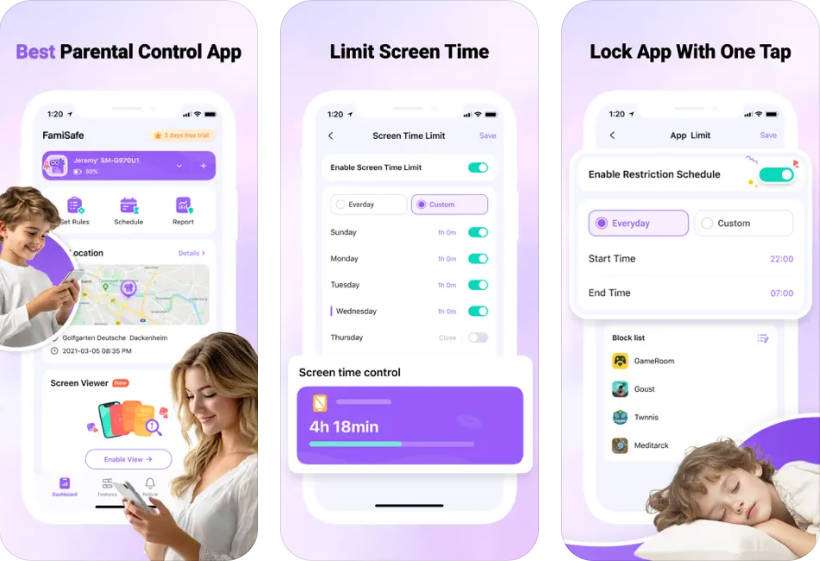Have you ever seen "TBH" in your teen's text messages and wondered what it means? You're not alone. TBH stands for "to be honest," and it's everywhere in teen communication today. But here's what might surprise you: this simple abbreviation has evolved into something much more complex than just sharing honest opinions.
For parents trying to keep up with their kids' digital world, understanding the tbh meaning is essential. What started as a shortcut for typing has transformed into a social tool that can build friendships—or unfortunately, tear them down. Let's decode this popular internet slang together and learn what you need to know to keep your teens safe online.

Table of Content
Part 1. What Does TBH Mean? Understanding the Basics
At its core, the tbh meaning in text is simple: "to be honest." When your teen types TBH, they're usually about to share their real thoughts or feelings about something. Think of it as the digital version of "honestly speaking" or "if I'm being frank."
💬 Common TBH Examples in Teen Texts:
Sharing opinions: "TBH, I don't really like that new song everyone's talking about"
Giving compliments: "You're actually really good at math, TBH"
Expressing feelings: "TBH, I'm kind of nervous about the test tomorrow"
The meaning of tbh started back in the early 2000s when text messages had character limits and typing on old phones was slow. Kids abbreviated everything to save time and space. But even though smartphones made typing easier, TBH stuck around because it became part of how young people communicate online.
Quick Fact: Sometimes, you might also see TBH used to mean "to be heard"—when teens feel like nobody's listening to them. But this is much less common. About 95% of the time, when you see TBH, it means "to be honest."
Part 2. TBH Meaning Across Different Platforms
💬 Regular Texting and Chat Apps
In regular text messages or chat apps like WhatsApp, the tbh meaning in chat stays pretty straightforward. Teens use it when they want to share an honest opinion or admit something they might feel awkward about saying directly. It's like adding a little cushion before saying something that might be uncomfortable.
👻 What Does TBH Mean in Snapchat?
Snapchat changed the TBH game completely. Here, teens have turned it into a social activity:
Popular Snapchat TBH Trends:
"Send me a name for a TBH" → Friends submit names, get honest opinions
"Swipe up for a TBH" → Direct personal feedback
"TBH + Rate" → Combines honesty with 1-10 ratings
📸 Instagram's TBH Culture
On Instagram, the tbh slang meaning has evolved into something like social currency. Here's how it works:
Teen posts: "Like for a TBH"
Friends like the post
Teen visits each profile and leaves TBH comments
Creates a chain of engagement and follows
Why this matters: Your teen might feel left out if they don't get a TBH, or hurt if the comment they receive isn't as enthusiastic as what their friends got. It's like the digital version of passing notes in class, but much more public and permanent.
Part 3. How Teens Really Use TBH: A Parent's Guide
✅ The Good Side
When used kindly, TBH can actually strengthen friendships. Teens share genuine compliments and support each other through honest feedback:
Building confidence: "TBH, you're the friend who always makes me laugh"
Offering support: "TBH, you handled that situation really well"
Encouraging growth: "TBH, your art has improved so much!"
❌ When TBH Turns Harmful
Unfortunately, some kids hide behind "honesty" to be cruel. The phrase "I'm just being honest" doesn't make hurtful words any less painful:
Direct attacks: "TBH, nobody really likes you"
Backhanded compliments: "TBH, you'd be pretty if you lost weight"
Social exclusion: "TBH, you try too hard to fit in"
🚨 Pay attention if your teen:
😔 Seems upset after checking their phone
🔄 Constantly refreshes apps waiting for responses
🤐 Suddenly becomes secretive about online activity
😟 Makes negative comments about themselves after being online
😰 Seems anxious about participating in social media trends
These could signal that TBH exchanges have become harmful rather than fun.
Why Teens Can't Just "Ignore It"
As parents, we might think, "Just don't participate!" But for teens, online interaction is a huge part of their social life. Not joining in TBH exchanges can mean:
Being excluded from friend groups
Missing social connections
Being seen as "weird" or antisocial
The pressure to fit in often outweighs their concerns about potential negativity.
Part 4. Monitoring Your Teen's Digital Communication with FamiSafe
Understanding slang like TBH is just the first step. You also need practical ways to keep your kids safe online without hovering over their shoulder 24/7. This is where FamiSafe becomes your partner in digital parenting.

🛡️ How FamiSafe Keeps Your Kids Safe
FamiSafe helps you stay informed about your teen's online activity in smart, respectful ways:
🎯 Smart Alerts That Matter
Instead of flagging every TBH, FamiSafe understands context. It alerts you when TBH appears with concerning language or in suspicious patterns. You'll know if "TBH" is being used to bully, not just to share opinions.
📱 See the Full Picture
The app monitors all major platforms where teens hang out—Instagram, Snapchat, TikTok, and more. You won't miss concerning conversations just because they switched apps.
👁️ Understand Without Invading
FamiSafe's screen capture feature helps you see concerning exchanges when needed, but it doesn't record everything. It's about safety, not spying.
📊 Track Patterns
Detailed reports show when and where your teen is most active online. If you notice mood changes after certain online activities, you can connect the dots and start helpful conversations.
🚀 Getting Started is Simple
Setting up FamiSafe takes just a few minutes:
Download the app on your phone and your teen's device
Customize alerts based on your family's needs
Start conversations using insights from the app
The goal is to create a safety net that catches real problems while still giving your teen room to grow.
Conclusion
Now you know that TBH means "to be honest," but you've also learned it's much more than just an abbreviation. In your teen's world, TBH can be a tool for building friendships, a source of validation, or unfortunately, a vehicle for cyberbullying.
The key to keeping your kids safe isn't banning every piece of internet slang or reading every message they send. It's about understanding their digital world, maintaining open communication, and using smart tools to stay informed about potential problems.
Your teen's digital wellbeing is too important to leave to chance. Take the first step today by starting that conversation, and explore how FamiSafe can support your family's online safety journey.
FAQs of TBH Meaning
-
Q1: Is TBH always used positively, or can it be negative?
TBH can definitely be both positive and negative. While many teens use it for compliments ("TBH, you're really funny"), others use it to deliver harsh criticism ("TBH, your outfit is terrible"). Watch for how your teen reacts after TBH exchanges—their emotions will tell you more than the words themselves. -
Q2: What's the difference between "TBH" and "to be heard"?
"To be honest" is by far the most common meaning—about 95% of the time. "To be heard" is rare and usually appears when someone feels ignored and wants attention for their opinion. If you see TBH, it almost always means "to be honest." -
Q3: What does "like for a TBH" mean on Instagram?
This is a social media trend where teens promise to write an honest comment about you if you like their post. It's usually a way to exchange compliments and boost engagement, but it can create pressure to participate and hurt feelings if some kids get better comments than others. -
Q4: How can I monitor my teen's TBH usage without invading privacy?
FamiSafe offers a balanced approach—it alerts you to concerning patterns without recording every conversation. You'll know if TBH appears with bullying language or in worrying contexts, but you won't see every casual chat. It's about catching real problems while maintaining trust with your teen.


